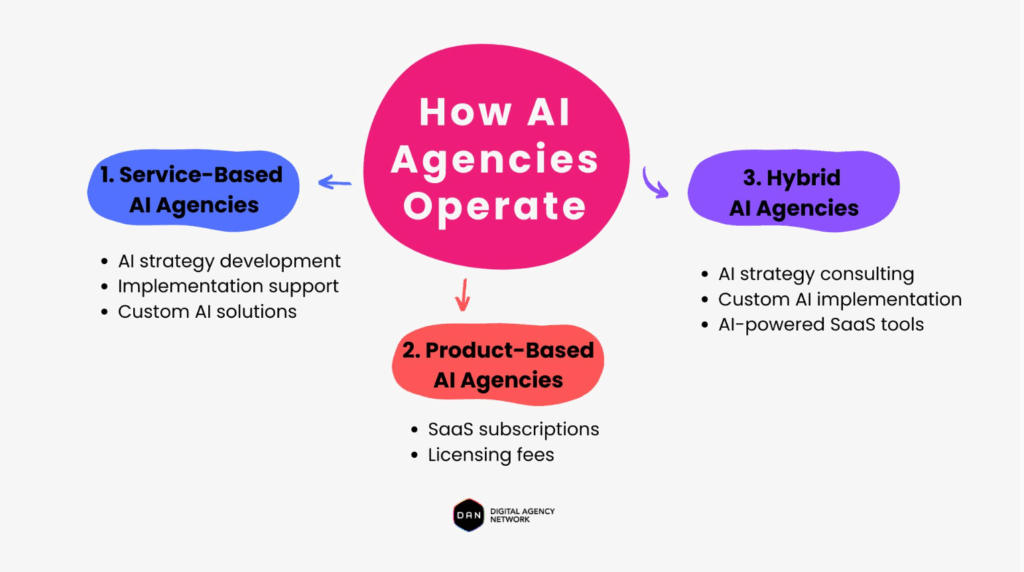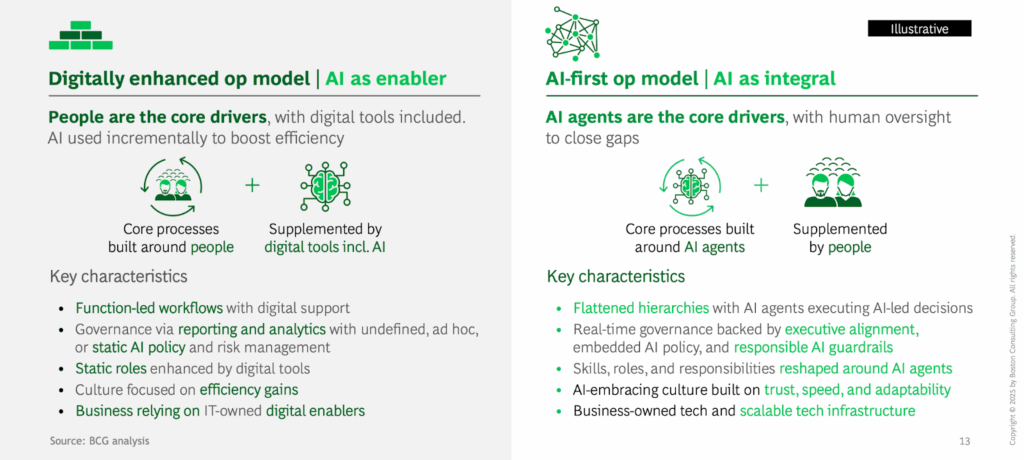What defines the next wave of digital marketing agencies? Creative, consulting, or automation-focused? The answer lies in adopting an AI-first foundation, rather than experimenting with AI tools.
A true AI-first service agency operates with AI at its operational core. It does not treat artificial intelligence as a support function but as the system driving value creation, client outcomes, and scalability.
The opportunity is clear. McKinsey estimates that generative AI could add $4.4 trillion annually in productivity growth across industries.
Boston Consulting Group confirms that AI-first companies scale faster with leaner teams while creating entirely new competitive advantages.
Yet, most businesses are far from maturity. 92% of companies plan to increase AI investment, but only 1% consider themselves “AI mature.”
The gap between aspiration and capability provides agencies with a significant opportunity.

By positioning themselves as an AI-first marketing agency, agencies can establish themselves as the missing link between technology and business impact.
What’s Inside
What Defines an AI-First Service Agency?
Let’s be precise: an AI-first service agency is not simply an organizational unit that adds AI tools to existing workflows. It is actually where all types of AI form the operating backbone, influencing how services are developed.
Instead of just relying on manual processes or passive automation, these types of agencies re-architect workflows around intelligent agents that can execute and adapt in real time.
These AI agents handle campaign optimization, all types of content generation, client reporting, and workflow orchestration. On the other hand, as you already know, “human teams” focus on strategic direction, supervision, and ethical oversight.
Deloitte emphasizes cognitive systems of AI-first services as follows:
Cognitive Advantage encompasses technologies capable of mimicking, augmenting, and in some cases exceeding human capabilities. With this capability, government clients can improve operational efficiencies, enhance citizen and end-user experience, and provide workers with tools to enhance judgment, accuracy, and speed.
This illustrates why the AI-first service agency is so critical.
So, clients are not just looking for partners who can experiment with AI tools; they need agencies that can embed AI into their operations.
In other words, an AI-first service agency is built around integration, acceleration, and maturity, the qualities that separate leaders from laggards in the AI era.
Before jumping into the next section, here is how AI agencies operate:

Now, let’s look at the traditional marketing agency and AI-first service agency comparison.
Traditional vs. AI-First Service Agency
To understand the value of an AI-first service agency, compare it to the traditional marketing agency model.
The difference goes far beyond the adoption of new tools, of course.
Traditional agencies might try AI, but they remain limited by human-led procedures, isolated data, and low automation.
By contrast, an AI-first agency rearchitects its entire model around intelligent agents that execute, adapt, and scale in real time.
In a nutshell:
- Traditional agencies are reactive: They adopt AI piecemeal, often adding tools without redesigning workflows.
- AI-first service agencies are proactive: They position AI as the operational core, with intelligent agents driving execution. Humans focus on strategy, client relationships, and oversight.
The takeaway is clear: traditional agencies risk being constrained by legacy processes, while AI-first agencies are already proving they can deliver at scale while exceeding clients’ expectations.
Before closing that section, we also want to mention BCG’s description of that comparison as a digitally enhanced operating model and an AI-first operating model.
Digitally enhanced operating model (Traditional Agency)
- People run the core workflows.
- AI is added in small, isolated ways.
- Processes are function-led with digital support on top.
- Governance is facilitated through reporting and analytics, often in an ad hoc manner.
- Roles stay static, just enhanced with tools.
- Culture focuses on small efficiency gains.
- Tech is owned by IT and treated as support.
AI-first service agency (AI-First Model)
- AI agents run the core workflows.
- People provide oversight, judgment, and ethics.
- Processes are designed around AI from the start.
- Decisions are made in real time with embedded governance.
- Roles and skills are reshaped around AI capabilities.
- Culture values speed, trust, and adaptability.
- Tech is business-owned and built to scale.

So, traditional marketing agencies (or digital marketing agencies) layer AI onto old processes. AI-first service agencies build new processes around AI. The result is not just faster execution but a complete rethinking of how services scale, how decisions are made, and how people create value.
Benefits of Teaming up with an AI-First Service Agency
When you cannot get the desired performance from human-led digital marketing agencies, working with an AI-first service agency is a good call.
The benefits extend across speed, scale, financial returns, and human creativity. Let’s see them closer:
1. Faster result delivery & real-time insights
AI-first agencies operate with AI agents as the execution engine.
- Not days; performance reports are generated in seconds.
- By removing delays, AI optimizes targeting and spending.
- Generative AI instantly tests creative iteration.
We know that AI-first companies scale faster with leaner teams, delivering results that outpace traditional peers.
2. Growth without headcount expansion
AI-first agencies (with AI agents) handle workloads at volume, with humans overseeing only the strategic and ethical dimensions.
Automating insurance workflows enables agencies to replicate the same processes in reporting, media optimization, and creative production. This supports growing client bases without proportional rises in costs.
3. Higher ROI and shareholder value
For agency clients, the implication is simple: working with an AI-first agency increases the likelihood of higher returns on marketing and service investments.
Instead of pursuing efficiency, businesses can achieve a competitive advantage through lower costs and quicker value creation.
4. Recentered human creativity
Cognitive technologies, the foundation of such agencies, free business teams from repetitive work, allowing them to focus on tasks that machines cannot replace.
This reallocation creates dual value:
- Clients benefit from marketing efforts that are both data-driven and creatively bold.
- Employees can apply their skills to higher-value, more rewarding work.
What Are AI-First Agency Services?
As we mentioned before, an AI-first service agency delivers services that look very different from those of a traditional agency.
Marketing Services
- AI-driven targeting: Hyper-personalized segmentation based on user behavior.
- Campaign optimization: Adjustment of budgets and bids using advanced predictive analytics.
- Automated reporting: Dashboards built by AI agents reduce reporting time.
Creative Services
- Content creation: AI creates copy, visuals, and video variants at scale (as you already know.)
- Concept testing: AI tests creative elements (visuals, ads, texts, videos, etc.) across audiences before launch.
- Dynamic and hyper-personalization: Agents personalize content across platforms in real time.
Consulting Services
- AI-powered diagnostics: AI-first service agencies identify customer gaps in workflows, performance, and data usage.
- Predictive scenario modeling: AI forecasting creates simulations of campaign outcomes or business decisions.
- Transformation playbooks: Roadmaps to embed AI into core operations.
Automation Services
- Workflow orchestration: AI agents manage cross-platform tasks, from CRM to scheduling.
- Process Automation: End-to-end handling of tasks like lead scoring, invoice processing, or scheduling.
- Multi-Agent Systems: Specialized agents collaborate; one generating content, another optimizing media, and another reporting results.
How Do AI-First Service Agencies Help Businesses?
The role of an AI-first service agency is to integrate AI maturity into a client’s operations and help them achieve value faster than they could on their own.
What’s more?
1. Closing the AI Maturity Gap
The AI maturity gap refers to experimentation without integration. AI-first service agencies close that gap by:
- Implementing AI into everyday workflows.
- Offering governance frameworks for safe adoption.
- Developing scalable infrastructure to move AI from pilots to production.
2. Maximizing Productivity Gains
AI marketing agencies (from creative to automation types) accelerate annual productivity gain for clients by redesigning workflows where AI can replace or augment human labor.
- Customer service can be augmented with AI assistants & agents, reducing resolution times.
- Fully automated marketing analytics free teams for strategic insight.
- Content creation cycles can shrink from weeks to hours with generative tools.
3. Building Trust
Adopting AI without governance creates risks. In other words, an AI-first model requires real-time governance, embedded policy, and executive alignment.
Agencies provide the frameworks that businesses lack internally:
- Policies for ethical AI use.
- Transparent reporting on algorithmic decisions.
- Risk management structures for bias, privacy, and compliance.
4. Preparing Teams for the Future
AI-first agencies help businesses reshape teams by:
- Training staff to supervise and collaborate with AI agents.
- Redefining roles around strategy, creativity, and ethics.
- Building a culture that embraces adaptability and trust in AI.
Bonus: Building the AI First Service Agency: A Practical Guide
Transitioning to an AI-first model requires a structured, strategic approach. Below is a framework based on insights from well-known organizations like Deloitte and McKinsey:
Step 1: Define Your AI-First Core
Agencies must begin by identifying which services can and should be AI-first.
- AI marketing agency: Deploy AI agents for campaign reporting, audience segmentation, and content optimization.
- AI creative agency: Use multimodal AI for concept generation, design testing, and personalized content production.
- AI automation agency: Redesign workflows with autonomous systems that handle reporting, scheduling, and CRM integration.
👉 Develop an AI-first blueprint where 60–80% of service delivery is AI-led.
Step 2: Recreating Workflows around Agents
Automation can free up one-third of worker time (almost 30%).
To achieve this, agencies must:
- Map high-volume workflows: Analytics reporting, asset tagging, and campaign monitoring.
- Replace static automation with AI agents that can make decisions in real time.
- Introduce human-in-the-loop guardrails for creativity, ethics, and brand safety.
👉 Conduct an AI readiness audit to categorize all processes into automate, augment, or human-only.
Step 3: Upskill Teams for Supervision
AI-first agencies still need human leadership. A Stanford study highlights that while 80% of U.S. workers may see AI impact at least 10% of tasks, interpersonal and strategic skills remain indispensable.
Agencies must invest in training staff to:
- Monitor AI outputs.
- Interpret AI-driven insights.
- Maintain ethical standards and client trust.
👉 Start an AI leadership program for all staff, focused on supervising AI agents and translating insights into strategy.
Step 4: Scale With Multi-Agent Systems
Agentic AI is the next frontier. PwC reports that multimodal GenAI frameworks allow specialized agents to collaborate, driving unprecedented levels of automation.
Examples for agencies:
- A creative agent generating campaign concepts.
- A media agency buys and optimizes ads.
- A reporting agent delivering real-time analytics dashboards.
👉Run a pilot project with a multi-agent setup, then scale once ROI is proven.
Step 5: Build Governance and Trust
AI-first agencies must prioritize transparency and ethics. The OECD stresses that organizations must embed fairness, accountability, and data ethics into AI use.
👉 Publish an AI ethics guide detailing how the agency ensures bias mitigation and explainability.
Conclusion
The truth is, agencies can’t just sprinkle AI on top of old ways of working and expect real change.
An AI-first service agency is something different. It’s about building services where AI agents handle the grind, so people can focus on what they do best: strategy, creativity, and building trust with clients.
That might look like that kind of agency where campaigns adjust themselves in real time or an AI-first creative agency where ideas can be tested and personalized for millions of people at once. It might be an AI-first automation agency that takes the friction out of workflows or an AI-first consulting agency that helps businesses finally move from experimenting with AI to actually seeing results from it.
At the heart of it, these agencies open up new possibilities. And as more companies invest in AI but still struggle to make it work, the ones built on AI-first principles will be the ones that set the pace.
digitalagencynetwork.com (Article Sourced Website)
#Future #Belongs #AIFirst #Service #Agency
